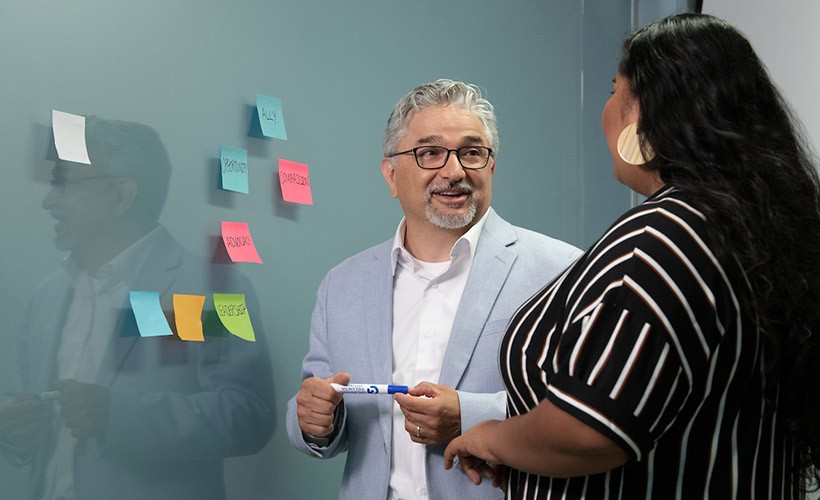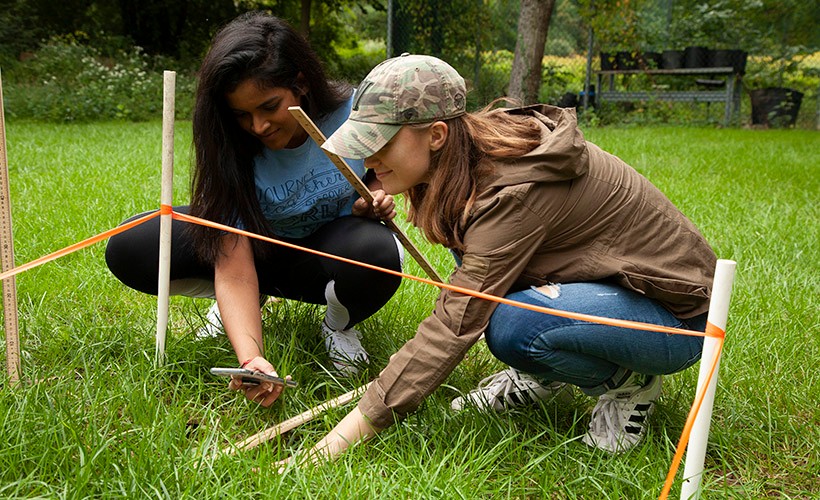GUIDING PRINCIPLES
The Department of Philosophy offers a diverse curriculum that allows students to explore a variety of philosophical ideas and perspectives while developing skills for the life-long love of learning.
The Philosophy Department of Villanova University is committed to excellence in the teaching and study of Philosophy, broadly conceived, with a primary emphasis on the History of Philosophy, Continental Philosophy, Social and Political Philosophy, and Ethics. In its graduate and undergraduate programs, its manner of collective governance, and its commitment to service, the Philosophy Department actively supports the mission and heritage of the University and the wider community served by the University. The courses taught and the research conducted by its faculty constitute a foundation for the rest of the University’s endeavors. In the Philosophy Department, the “enduring commitments” of the University Mission come alive.
The Philosophy Department is a manifestly “diverse community of scholars dedicated to the highest academic standards.” It engages students in critical thinking, intellectual scrutiny and moral reflection. It affirms “the intrinsic good of learning, contemplation and the search for truth.” It “encourages interdisciplinary research, teaching and scholarship,” and it insists on “an informed respect for the differences among peoples and cultures” from a global perspective. Faculty in the Philosophy Department present the Catholic intellectual tradition for students “in ways that engage diverse religious, intellectual and cultural traditions in a vigorous and respectful pursuit of truth and wisdom.” Faculty in the Philosophy Department also apply what they know “to better the human condition” and to foster a “responsible stewardship of the environment” and the more than human world.*
*All quotations from the University Mission.
26 September 2010
GOALS
Knowledge:
G1: Knowledge of the history of philosophy, including the Christian philosophical tradition and its foundational sources in Ancient and Medieval philosophy.
G2: Knowledge of the principal areas of philosophical inquiry and understanding of how a distinctly philosophical understanding applies to one or more areas of human experience.
Skills:
G3: Understanding and analysis of primary source philosophical texts, ideas, and arguments.
Values:
G4: Appreciation of and engagement with ideas and concepts that are ambiguous, challenging, and that escape the narrow bounds of practicality and traditional categories of understanding.
OBJECTIVES
G1: Knowledge of history of philosophy:
- Demonstrate an understanding of major concepts in classical ancient philosophy.
- Demonstrate an understanding of major concepts in foundational Christian philosophy (from late antiquity and the middle ages).
- Demonstrate an understanding of major concepts in early modern philosophy.
- Be able to explain and illustrate connections and influences between various historical philosophers studied.
G2: Knowledge of areas of philosophical inquiry and application:
- Demonstrate knowledge of relationship and differences between main areas of philosophy.
- Demonstrate thoughtful application of philosophical concepts to several specific areas of human experience.
G3: Analysis
- Demonstrate clear thinking in class discussion and written work.
- Demonstrate philosophical understanding of textual claims in support of an argument.
- Demonstrate the interconnections, agreements, disagreements and shared assumptions of different ways of thinking.
- Demonstrate the application of philosophical thinking in evaluating and defending or refuting claims about how to understand some area of human experience.
- Demonstrate the articulation and defense of ideas where available knowledge and evidence do not support a single conclusion and where multiple interpretations are possible.
G4: Appreciation of and engagement with challenging and ambiguous concepts:
- Demonstrate openness to new ideas by being able to reflect upon and re-evaluate deeply held assumptions and views.
- Demonstrate appreciation for the complexity of issues and willingness to examine issues from many different perspectives.
- Demonstrate ability to reflect on and critically evaluate new and unfamiliar concepts.
- Demonstrate awareness of and thoughtful engagement with, underrepresented voices.
- Appreciate and thoughtfully engage with the diverse sources of philosophy beyond or in comparison with the Western tradition.
As a community of scholars and students, we, the department of philosophy, share a commitment to pluralism and diversity so as to develop our collective understanding of the forces that both distinguish us and unite us together. We are committed to civil and respectful dialogue apportioned to a diverse array of viewpoints.
Within the discipline of Philosophy, diversity means many different things. Three primary elements pertain to content, methodology, and demographics.
- Content: That the curriculum and course material should include a range of diverse topics and perspectives.
That the curriculum ought to represent a diversity of approaches and perspectives
That readings from underrepresented scholars in philosophy be present on syllabi
That a variety of perspectives on topics be presented
- Methodology: That diverse methodologies should be represented and appreciated in the department course offerings
That students and faculty appreciate the rich variety of approaches to philosophical research and teaching
That students and faculty respect different approaches to an array of questions within philosophy
That no particular philosophical methodology be privileged
- Demographics: That the faculty, graduate student population, and undergraduate major population be inclusive and diverse
That the department serves as a welcoming space for all backgrounds, identities, and viewpoints
That our shared intellectual endeavor makes us curious and open to learn from one another
That underrepresented voices in philosophy find a supportive site for exploring and presenting ideas



